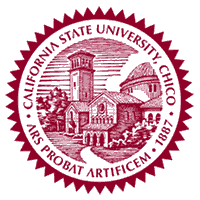November presentations
The CSU Math Council Colloquia (MC2) series provides CSU faculty in mathematics, statistics, and mathematics education with the opportunity to network and share best practices in any topics related to university level mathematics and statistics education.
Issues in Mathematics Education for Preparing Teachers
Hosts:
- Rick Ford, Professor, Department of Mathematics & Statistics, Cal State Chico. rford@csuchico.edu
- Claudia M Bertolone-Smith , Assistant Professor, School of Education, Cal State Chico. cmbertolone-smith@csuchico.edu
Friday November 6th [Zoom Link]
| Time | Name | Affiliation | Title | Abstract |
|---|---|---|---|---|
| 3:00 PM | Katy Early & Jenny Langer-Osuna KEarly@csuchico.edu / jmlo@stanford.edu | CSU Chico / Stanford | Revising the California Framework: Mathematics: Investigating and Connecting | While the CCSSM remain the same, the 2021 Mathematics Framework shifts the emphasis of instruction in several significant ways, particularly to address issues of equity, the needs of English learners and students with learning differences. Grade level chapters are organized in grade bands. We will share how Chapter 6, TK - 5, Mathematics: Investigating and Connecting envisions mathematics instruction as student-driven, investigative, and collaborative. |
| 3:30 PM | Greisy Winicki-Landman greisyw@cpp.edu | Cal Poly Pomona | Visual representations in the learning of mathematics – their roles in a course for pre-service teachers | This presentation provides an opportunity to share some of the experiences designed for elementary school pre-service teachers across three courses and also a forum to analyze and reflect upon the many different and rich roles that visual representations play in learning mathematics. |
| 4:00 PM | Marquita Grenot-Scheyer mgrenot-scheyer@calstate.edu | Chancellor’s Office | CSU System Efforts Supporting the Mathematics Education of Teachers | Mathematics education is a critical area for all students; in many ways, mathematics education which begins in elementary school, is critical to the success of students in postsecondary education. AVC Grenot-Scheyer will discuss how the CSU works with the Commission on Teacher Credentialing (CTC) and campus leaders and faculty to ensure teachers are well prepared in mathematics education. |
Friday November 13th [Zoom Link] [Recording]
Recorded Session Passcode: =9CfTcK!
| Time | Name | Affiliation | Title | Abstract |
|---|---|---|---|---|
| 3:00 PM | Krista Strand KLStrand@csuchico.edu | CSU Chico | This Class is “Pointless”: Using a Proficiency-Inspired Grading system in K-8 Math Content Courses | In this presentation, I’ll share my proficiency-based and points-free grading system for K-8 math content courses. I will also discuss my motivations for moving away from a more traditional grading system, and I will reflect on my experiences with proficiency-based grading so far, two semesters in. |
| 3:30 PM | Brian Lim lim@csus.edu | Sacramento State | edTPA preparation in Multiple Subject credential program | Sacramento State University has very high passing rate on multiple subject edTPA. The presenter will show the comparison to other California educator preparation programs as well as educator preparation programs nationwide. He will also share how the program supports the candidates in preparation for the edTPA. |
| 4:00 PM | Bridget Druken & Kyle Vu bdruken@fullerton.edu | California State University, Fullerton | Using Children’s Mathematical Thinking to Motivate Elementary Math Content/Practices | In this workshop presentation, participants will watch a short video of students’ mathematical thinking related to operations and fractions in a math content course for pre-service teachers (PSTs). Resources and experiences with using videos during math class will be shared, including ways in which these videos support PSTs in better understanding the current K-12 Common Core state standards for mathematics (CCSSM). Participants will be encouraged to gather and share additional videos on children’s mathematical thinking suited for mathematics content preparation courses. |
Friday November 20th [Zoom Link] [Recording]
| Time | Name | Affiliation | Title | Abstract |
|---|---|---|---|---|
| 3:30 PM | Sarah Ives sarah.ives@csus.edu | CSU Sacramento | Teaching PSTs to Elicit and Interpret Student Thinking in a Virtual Setting w/Number Talks | Eliciting and Interpreting Student Thinking (EIST) is a necessary skill for Pre-service Teachers (PST) to develop within their teaching preparation program. How do we do this in the current virtual setting? This talk will share how one mathematics teacher educator used number talks and peer-run throughs to engage PSTs in developing this skill of EIST within the online setting. The presentation will include samples of PSTs work and engage participants in discussion of ways to improve instruction on PSTs abilities to represent student mathematical thinking. |
| 4:00 PM | Babette M. Benken & Susan Nickerson babette.benken@csulb.edu snickerson@sdsu.edu | CSU Long Beach & San Diego State | Preparing Elementary Teachers: The Essential Role of an Integrative and Robust Sequence of Math Content Courses | CSU Long Beach and San Diego State University require 12 units of mathematics for prospective elementary teachers. We will share the goals of our two programs. We will also share our avenues for integrating mathematics and pedagogy and how the culminating mathematics course is viewed as an integrative or capstone course. |
| 4:30 PM | Claudia Marie Bertolone-Smith cmbertolone-smith@csuchico.edu | CSU Chico | Too Much to Teach in Too Little Time: Tensions and Possibilities for Elementary Math Methods | This session will be a brief report on a self-study investigating the issues that arise for math educators due to the inadequate time for mathematics in elementary teacher education. In our research, we have identified three tensions that surfaced: between teaching math content and math pedagogy, between theory and practice, and addressing the social contexts of teaching mathematics. We propose three design principles for math methods courses that might guide the development of course content and work. We will discuss course content and assignments created and tested in our courses to address the aforementioned tensions. |
Participating Institutions






